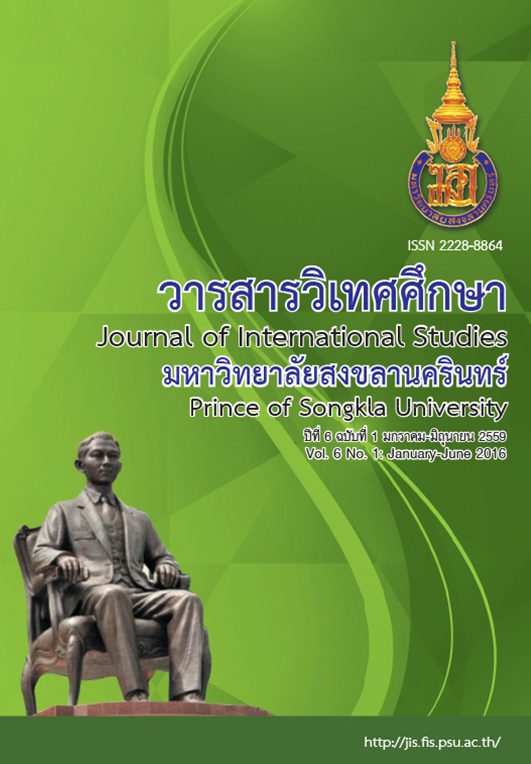Analysis on the “Difficult Dialogue between Marxism and Nationalism”: Re-evaluating Marxist Classical Writers’ Statements on Nationalism
Main Article Content
Abstract
Both Marxism and Nationalism are listed among the most influential strains of thought in modern times. Scholars have long held that the dialogue between Marxism and Nationalism is difficult in their ideological collision. Therefore, Marxist classical writers’ statements on Nationalism had been frequently evaded, neglected, ridiculed or even criticized by some western scholars. In spite of their marked variations, the idea collisions of Marxism and Nationalism have historical origins and a basis in reality. By highlighting the macroscopic nature of historical materialism and distinguishing “two kinds of Nationalism”, Marxist classical writers’ statements on Nationalism not only introduced the “Long-period Theory” and “Mega Theory” backgrounds of "Human Liberation", but analyzed the “dual nature” of Nationalism from the standpoint of the proletarian. The interaction between interNationalism and Nationalism had been reflected in the scientific socialist practices from “workers without homeland” to “how to sing the song of homeland”. Marxism and Nationalism have multidimensional-intersections rather than a so called “difficult dialogue”. Thus, it is highly necessary to analyze and counter-criticize the “criticism” on the allegedly “difficult dialogue between Marxism and Nationalism”.
Article Details
Statements and opinions expressed in articles herein are those of the authors and do not necessarily reflect the position of the editors or publisher.
Article, information, text, image, etc. which are published in Journal of International Studies, belong to Journal of International Studies. If anybody or any organization would like to use part or whole of them, they must receive written permission from Journal of International Studies before usage.
References
Avineri, S. (1990). Toward a socialist theory of Nationalism. Oxford: Oxford University Press.
Berlin, I. (2002). Going against the tide: collection of essays on the history of ideologies. Nanjing: Yilin Press.
Chen, M. (2014). National identity from the aspect of Marxism. Beijing: Press of Chinese Social Sciences.
Cummins, I. (1983). Marx, Engels and Nationalism movement, Hubei People’s Press.
Duara, P. (2003). Rescuing history from the nation: questioning narratives of modern China. Beijing: Social Sciences Academic Press.
Engels, F. (1987). On the issue of Nationalism by Marx and Engels (volume 1). Beijing: The Ethnic Publishing House.
Hechter, M. (2012). Containing Nationalism. Beijing: Press of Renmin University of China.
Hu, J. (2015). The Reinterpretation of Modern Marxism Criticism. Foreign Literature,3, 120-123.
Lenin, V. (1987).The collected works of Lenin (volume 4). Bejing: People’s Press.
Lenin, V. (1990). The collected works of Lenin (volume 24), Beijing: People’s Press.
Lenin, V. (1988).The collected works of Lenin (volume 25), Beijing: People’s Press.
Li, C. (2013). Nation-state identity of Marxism. Journal of Chinese Social Sciences, 2013,5-9.
Li, J. & Du, X. (2015). Difference, opposition, integration and transition from liberalism, Nationalism to Marxism, Journal of Guangxi Social Sciences,2, 128-131.
Ma, D. (2012). National identity, patriotism and Nationalism. Journal of Ethno Studies,3, 8-10.
Mao, Z. (1991). The collected works of Mao Zedong (Volume 1). Beijing: Social Sciences Academic Press.
Meisner, M. (1967). Li Ta-chao and the origins of Chinese Marxism. Cambridge: Harvard University Press.
Munck, R. (1986). The difficult dialogue: Marxism and Nationalism. London and Atlantic Highlands. NJ: Zed Books Ltd.
Song, C & Luan, X. (2011). Analysis of Nationalism from the point of Marxism, 6, 40-43.
Stalin, J. (1979). The collected works of Stalin (Volume 1). Bejing: People’s Press.
Tan, K. C. (2014). Justice without borders: cosmopolitanism, Nationalism and patriotism. Chongqing: Chongqing Press.
Wang, X. (2007). Criticism, seeking help and absorption: re-understanding the Nationalism related statements by Marxism classical authors. Chinese Journal on Ethnology, 5, 19-25.
Zhou, C. (2005). Nationalism discourse and modern China. Journal of the Second College of Nationalities, 2, 61-64.
Zhang, J. (2015). EST teaching model based on the self-created parallel corpus. Journal of Jiangxi University of Science and Technology, 2, 73-77.


